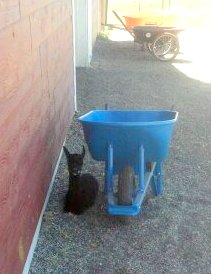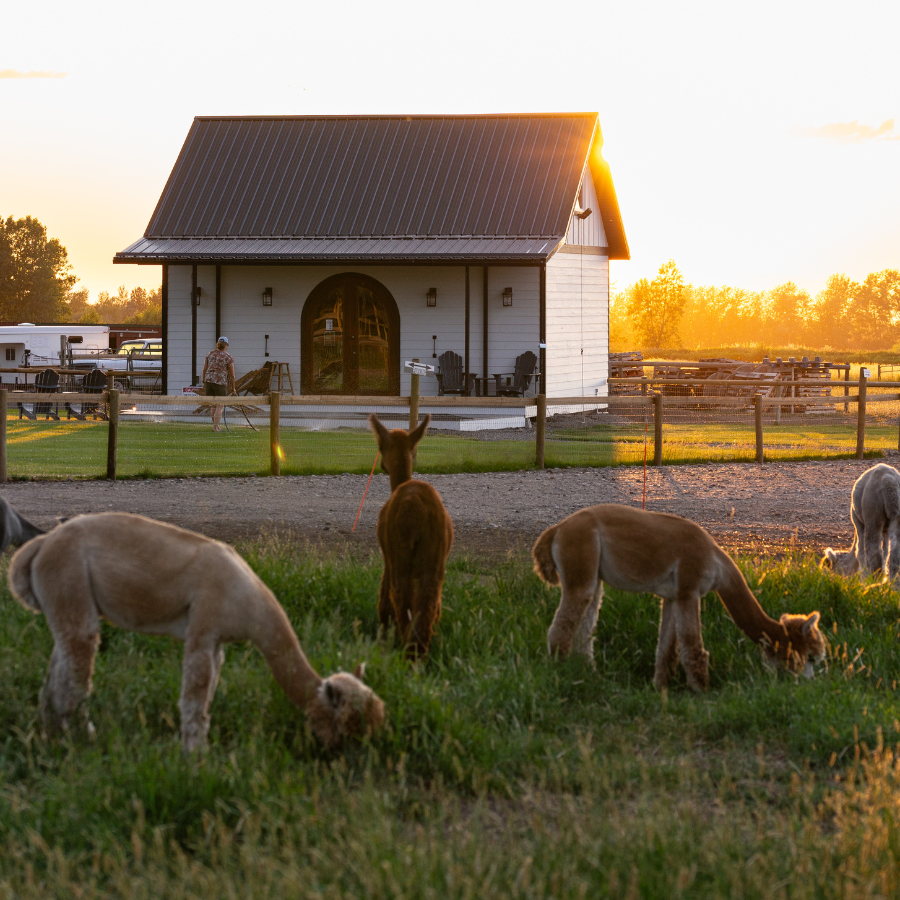There are very few signs that actually tell you that a baby will be born today. However, a combination of these signs may indicate that another alpaca is on its way.
- The mother separates herself from the herd.
- She constantly visits the manure pile without going to the bathroom.
- Getting up and laying down every few minutes.
- Her vulva becomes enlarged.
- Her mammary glands become enlarged as the milk gets ready for the baby. I have seen this happen 3 weeks before the birth.
- The dam lays on her side and heaves and sighs. Sometimes this happens 2 weeks before the birth where the babies are turning and getting ready to enter the birth canal and greatly discomforts the mother.
- Loosing the cervical plug - a gooey like mass that helps protect the baby from infections and disease during gestation. Kind of looks like a jelly fish on the beach.
- Sitting around, chewing her cud. Sometimes, they just get up, have the baby and that is that.
When the dam is in labor, it is quite obvious, and is a different blog topic.
- What is the temperature outside - is there a breeze, will it be rainy in the next hour or so? If so, move the mom and baby into a more protected area.
- Is the baby moving around? It should start shaking its head and kicking its legs, grunting.
- The baby should cush within 5-20 minutes. I know this is a big window, but some get themselves together faster than others.
- Is the baby starting to shake and shiver? This is not necessarily a bad thing. If you know the baby is warm enough and it's shaking, this means the blood and oxygen are reaching the extremities and getting the muscles fired up. This is a good thing.
-
Is the mom paying attention? Some of the experienced moms are quite casual about the baby until it starts moving around. Then, they start to pay attention more.
- Is the mom clicking and humming to the cria? They helps the baby recognize her voice amongst a sea of legs (408 as a matter of fact in our herd).
The first milking is extremely important, as this is when they receive their entire immune system for the rest of their lives. The first milk they receive - colostrum - should be received in just a few hours. If the baby is strong, it should be trying to stand within 20-30 minutes and beginning looking for milk from the mom withing 30-45 minutes. If this is not happening, you need to intervene.
As the baby strengthens over the days, watch for the following:- The mother is continually receptive to the baby drinking and not kicking them off. This usually happens with first time moms.
- Watch that other cria are not stealing a snack from a neighbor mom. Some moms allow this, others do not, but it depletes the amount available for the baby.
- The baby should be drinking milk about every hour or so, for 3-10 minutes. Look for the milk mustache to ensure they are actually gettin milking and not just searching for the teet.
- Watch that the baby is staying near the mom for the first few days. Over time, they will get more and more adventurous.
-
Be wary of the temperatures, especially for preemie babies. They have a difficult time regulating their body temperatures. For the first two weeks, their body temperature should be between 100F and 102F. If they overheat, they can die quickly.
-
Crias should gain about 1/3 to 1/2 pound per day in weight. If they are jumping around, they are healthy and getting enough. If they are lethargic, droopy headed and not keeping up with the herd, they may need help.

- Watch if you have dogs or llamas - or other cria kids - that they do not play to rough with them. What is fund for one could be terrorizing for the other.
- If the baby separates themselves continually from the herd, they may be telling you something. One cria we had continuously separated herself from her mother, going next to the barn and a wheelbarrow. She was growing and walking around, but after only 4 days, she passed away. Luckily, this is the only cria we had that has lived that long and then died. Her body just failed to thrive and couldn't go on.
Watch them, let them grow and let the mom's do their work. It is amazing the instinct they have for their babies, either their first or their twelfth. Enjoy!

